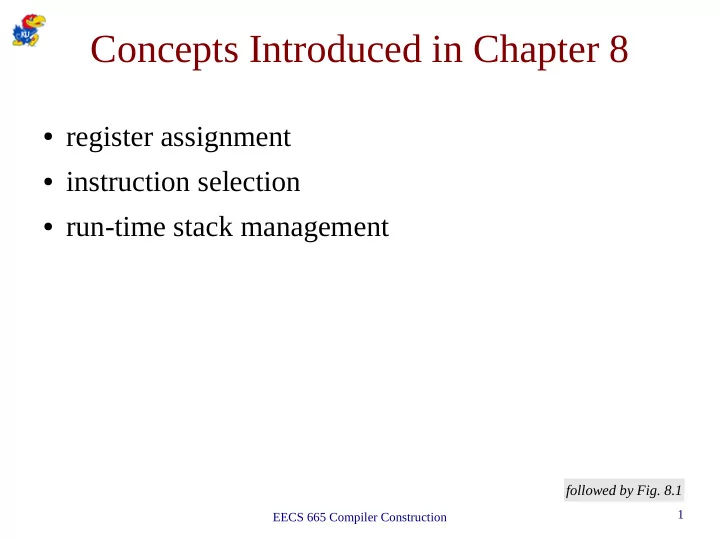

Concepts Introduced in Chapter 8 ● register assignment ● instruction selection ● run-time stack management followed by Fig. 8.1 1 EECS 665 Compiler Construction
Target Program The target program can be – Absolute machine language – Relocatable machine language – Assembly language 2 EECS 665 Compiler Construction
Tasks Performed by a Code Generator ● Register assignment ● Instruction selection ● Management of the run-time stack 3 EECS 665 Compiler Construction
Register Assignment ● Register assignment is the assignment of temporaries to hardware registers. ● Challenges – Use of register pairs – Overlapping of registers – Operations in specific registers – Spills 4 EECS 665 Compiler Construction
Instruction Selection ● Instruction selection is the mapping of the intermediate language operations to machine instructions. ● Have to choose not only the appropriate instructions, but also the addressing mode of each operand. 5 EECS 665 Compiler Construction
SPARC Addressing Modes Name Assembly RTL immediate n n register %n r[n] register deferred [%n] M[r[n]] displacement [%n+m] M[r[n]+m] [%n-m] M[r[n]-m] indexed [%n+%m] M[r[n]+r[m]] 6 EECS 665 Compiler Construction
Run-Time Stack Management ● Allocating and deallocating space on the run-time stack when entering and leaving a function. ● Partitioning the register set into scratch and nonscratch sets. ● Saving and restoring nonscratch registers that are used in the function. ● Dedicating registers for managing the run-time stack. ● Passing arguments. ● Responsibility of callee versus caller. 7 EECS 665 Compiler Construction
Evaluation Order of Arguments ● What is printed by the following program? i n t g = 0 ; i n t f 0 ( ) { r e t u r n g ; } i n t f 1 ( ) { r e t u r n + + g ; } m a i n ( ) { p r i n t f ( “ % d % d \ n ” , f 0 ( ) , f 1 ( ) ) ; } 8 EECS 665 Compiler Construction
Recommend
More recommend